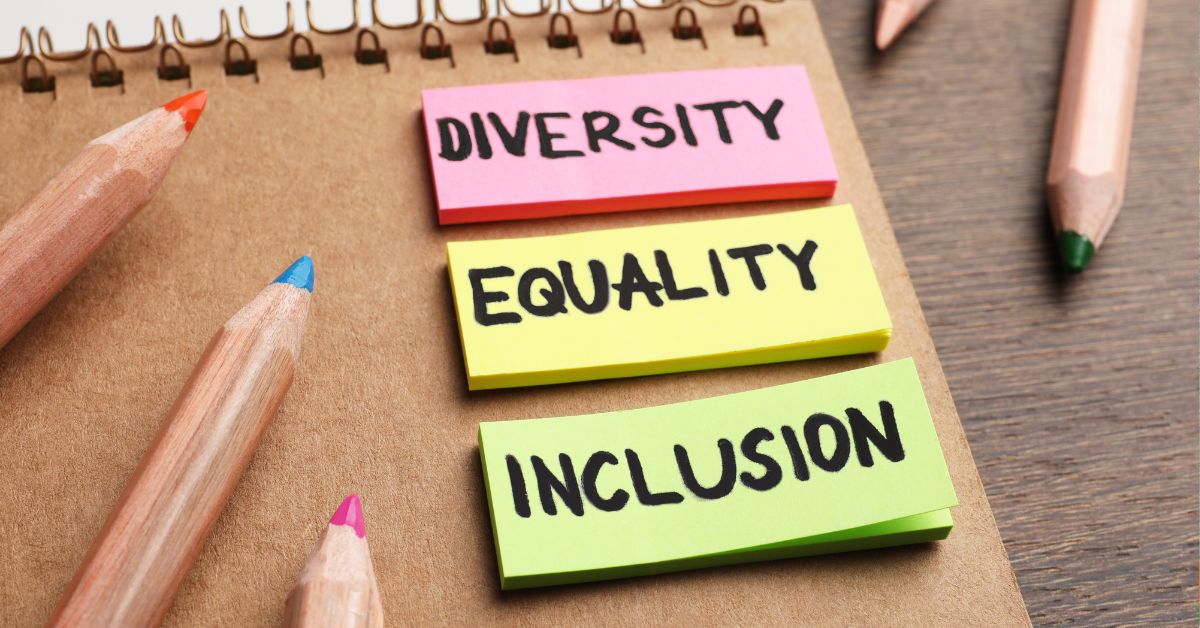The working landscape keeps changing in the UK, with fluctuating opinions on hybrid and online working, changing policies, and the cost-of-living crisis. However, one thing that doesn’t change is that the principles of equality and diversity are pillars of progress and inclusivity.
At Safety Services Direct, we’ve been helping shape happy, safe workplaces since 1994. So, we’ve created this guide to creating an inclusive workplace, which aims to foster a culture where everyone is valued and respected, irrespective of their background or identity.
Understanding Equality and Diversity
Equality and diversity aren’t just buzzwords; they are fundamental principles that promote fairness, inclusivity, and respect for all individuals, regardless of their differences. Here’s a breakdown of each concept:
Equality
Equality refers to being equal, fair, and free from discrimination. It encompasses the idea that everyone should have equal opportunities, rights, and access to resources, regardless of gender, race, age, disability, sexual orientation, religion, or socioeconomic status. Equality seeks to ensure that individuals are treated fairly and have the same chances to succeed, thrive, and participate fully in society.
Diversity
Diversity, on the other hand, celebrates the richness of human differences, including but not limited to differences in race, ethnicity, gender, age, sexual orientation, disability, religion, culture, and socioeconomic background. Diversity acknowledges that each person is unique and brings a valuable perspective, experience, and contribution to the table. Embracing diversity involves creating environments where all individuals feel valued, respected, and included, regardless of their differences.
As diversity and inclusion expert Verna Myers put it, “Diversity is being invited to the party; inclusion is being asked to dance”.
Why is Equality and Diversity Important?
Unfortunately, though we may feel that the UK is making strides, more than a third of UK adults still report experiencing workplace discrimination either while at work or when applying for a job. In addition, in the UK, a median gender pay gap of 14.3% tilts in favour of men, reflecting a persistent challenge. Compounding the problem, a staggering two-thirds of workers express discomfort in raising a claim if they face discrimination. It’s apparent that gender, age, and racial prejudices still linger within UK businesses, with repercussions such as substantial fines when these biases are confronted.
Equality and diversity go hand in hand, working together to create inclusive and equitable societies where everyone can reach their full potential and contribute to the collective well-being.
By promoting equality and embracing diversity, organisations and communities can foster creativity, innovation, and collaboration, leading to greater success and prosperity for everyone.
Tips to Creating an Inclusive & Diverse Workplace Culture
Leadership sets the tone for inclusivity, paving the way for a workplace where every voice is heard and valued. Establishing inclusive policies and fostering open communication is essential in cultivating a culture where diversity thrives. However, it doesn’t end there. Here are some important ways to promote equality and diversity at work:
1. Recruitment and Selection
Recruitment processes serve as the gateway to diversity. By promoting inclusivity in hiring practices and mitigating biases, organisations can build teams that reflect the richness of their communities.
2. Training and Development
One crucial way to advance equality and diversity is through comprehensive training programs. The Equality Act 2010 serves as a beacon, consolidating anti-discrimination laws into a cohesive framework. Training initiatives, such as our Equality and Diversity Policy Training Course Online, equip employees with the knowledge and awareness to navigate the complexities of diversity in the workplace.
This course ensures that every worker in your organisation is attuned to the issues of equality and diversity and understands their role in fostering an environment free from discrimination, bullying, and harassment. Employers bear the legal responsibility for the actions of their employees, and providing comprehensive training is a cornerstone of fulfilling this duty.
3. Promoting Equal Opportunities
Fairness in career advancement and remuneration are paramount to upholding equality. By addressing pay gaps and supporting underrepresented groups, organisations can create pathways for every individual to thrive and succeed.
4. Mind Your Language
It is essential to review all communications to ensure they are free from discriminatory or sexist language. Even unintentional, careless or stereotypical language can create a perception of inequality and make individuals feel vulnerable. Update corporate forms and documents to include all individuals, respecting their preferred pronouns.
5. Use Objective Criteria
When it comes to recruitment, training, and promotions, rely on clear and objective criteria to ensure decisions are based on merit and not influenced by bias. Encourage group decision-making processes or consider conducting audits if there are concerns about a particular team, manager, or business unit. This approach fosters fairness and transparency, promoting an environment where everyone has equal opportunities for advancement.
6. Fostering a Respectful Workplace Culture
Zero-tolerance policies for discrimination and harassment underscore the commitment to a respectful workplace culture. Promoting allyship and celebrating diversity through cultural events and initiatives further solidify the foundation of inclusivity.
7. Measuring Progress and Accountability
Metrics for tracking diversity and inclusion efforts can help guide progress. Regular assessment and evaluation ensure that organisations remain steadfast in their commitment to fostering good relations with a diverse workforce, holding individuals and the organisation accountable for their actions.
Want to Embrace Diverse Backgrounds and Improve Equality?
As we journey towards a future defined by inclusivity and respect, the principles of equality and diversity are fantastic guides. Organisations can create workplaces where every individual can thrive and flourish by prioritising fairness, embracing diversity, and fostering a culture of respect.
To promote equality, diversity, and inclusion, we recommend you start with training. Our course will give your team a fantastic foundation for understanding how employees with different backgrounds can contribute to the team, as well as provide an overview of types of discrimination and how to report a concern.
To learn more about this course or our consultancy services, get in touch with us at 0121 3487828.








